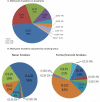Prognostic impact of KRAS mutation subtypes in 677 patients with metastatic lung adenocarcinomas
- PMID: 25415430
- PMCID: PMC4479120
- DOI: 10.1097/JTO.0000000000000432
Prognostic impact of KRAS mutation subtypes in 677 patients with metastatic lung adenocarcinomas
Abstract
Background: We previously demonstrated that patients with metastatic KRAS mutant lung cancers have a shorter survival compared with patients with KRAS wild-type cancers. Recent reports have suggested different clinical outcomes and distinct activated signaling pathways depending on KRAS mutation subtype. To better understand the impact of KRAS mutation subtype, we analyzed data from 677 patients with KRAS mutant metastatic lung cancer.
Methods: We reviewed all patients with metastatic or recurrent lung cancers found to have KRAS mutations over a 6-year time period. We evaluated the associations among KRAS mutation type, clinical factors, and overall survival in univariate and multivariate analyses. Any significant findings were validated in an external multi-institution patient dataset.
Results: Among 677 patients with KRAS mutant lung cancers (53 at codon 13, 624 at codon 12), there was no difference in overall survival for patients when comparing KRAS transition versus transversion mutations (p = 0.99), smoking status (p = 0.33), or when comparing specific amino acid substitutions (p = 0.20). In our dataset, patients with KRAS codon 13 mutant tumors (n = 53) had shorter overall survival compared with patients with codon 12 mutant tumors (n = 624) (1.1 versus 1.3 years, respectively; p = 0.009), and the findings were confirmed in a multivariate Cox model controlling for age, sex, and smoking status (hazard ratio: 1.52, 95% confidence interval: 1.11-2.08; p = 0.008). In an independent validation set of tumors from 682 patients with stage IV KRAS mutant lung cancers, there was no difference in survival between patients with KRAS codon 13 versus codon 12 mutations (1.0 versus 1.1 years, respectively; p = 0.41).
Conclusions: Among individuals with KRAS mutant metastatic lung cancers treated with conventional therapy, there are no apparent differences in outcome based on KRAS mutation subtype.
Figures







References
-
- Slebos RJ, Kibbelaar RE, Dalesio O, et al. K-ras oncogene activation as a prognostic marker in adenocarcinoma of the lung. The New England journal of medicine. 1990;323:561–5. - PubMed
-
- Keohavong P, DeMichele MA, Melacrinos AC, Landreneau RJ, Weyant RJ, Siegfried JM. Detection of K-ras mutations in lung carcinomas: relationship to prognosis. Clinical cancer research. 1996;2:411–8. - PubMed
-
- Tsao MS, Aviel-Ronen S, Ding K, et al. Prognostic and predictive importance of p53 and RAS for adjuvant chemotherapy in non small-cell lung cancer. Journal of clinical oncology. 2007;25:5240–7. - PubMed
-
- Schiller JH, Adak S, Feins RH, et al. Lack of prognostic significance of p53 and K-ras mutations in primary resected non-small-cell lung cancer on E4592: a Laboratory Ancillary Study on an Eastern Cooperative Oncology Group Prospective Randomized Trial of Postoperative Adjuvant Therapy. Journal of clinical oncology. 2001;19:448–57. - PubMed
Publication types
MeSH terms
Substances
Grants and funding
LinkOut - more resources
Full Text Sources
Medical
Miscellaneous

